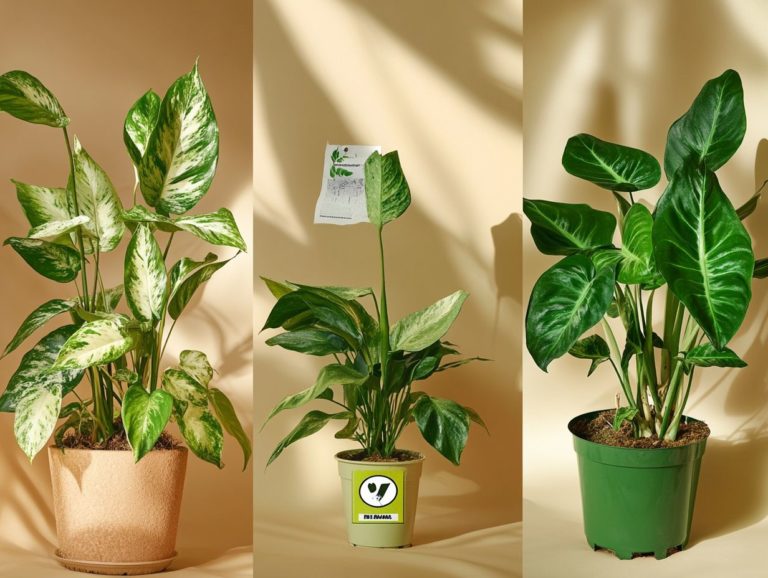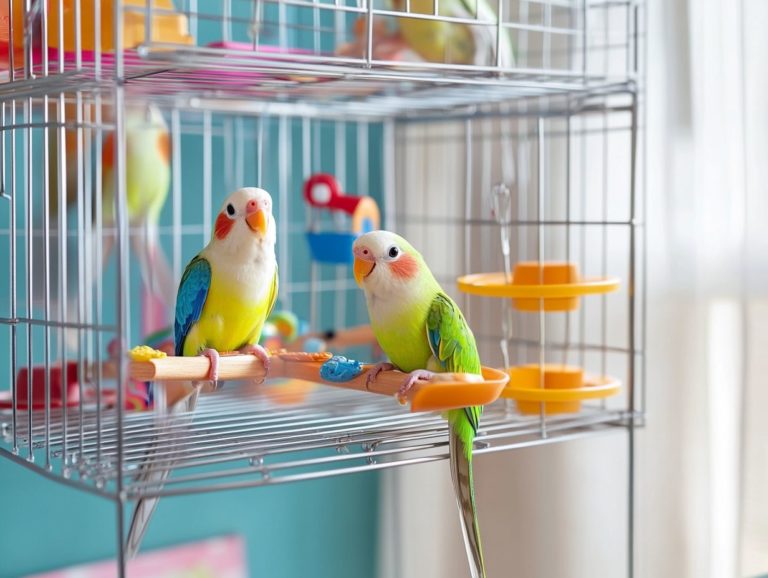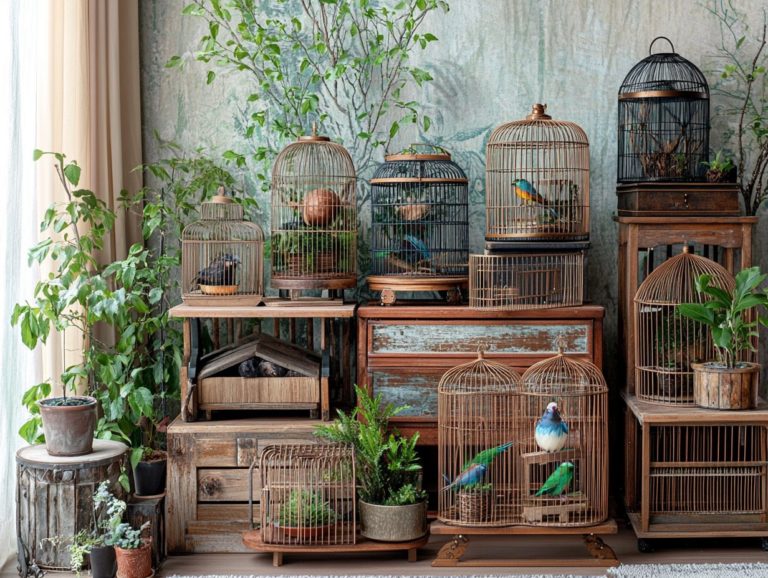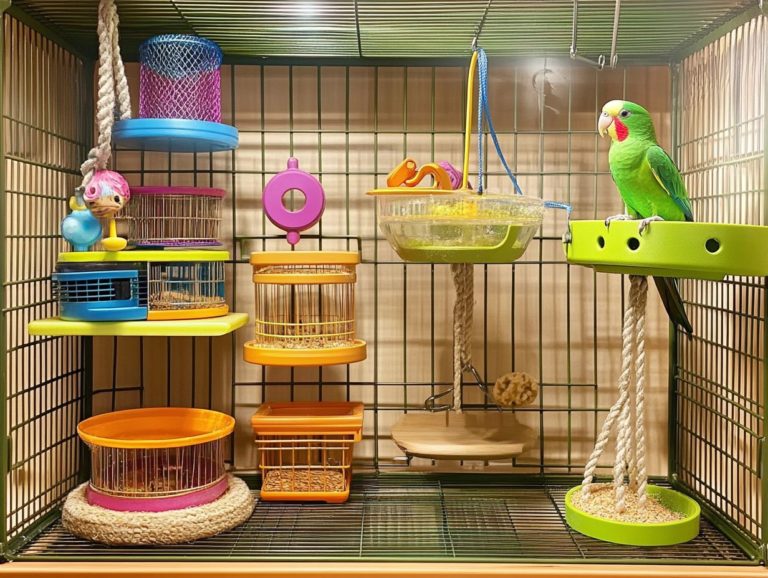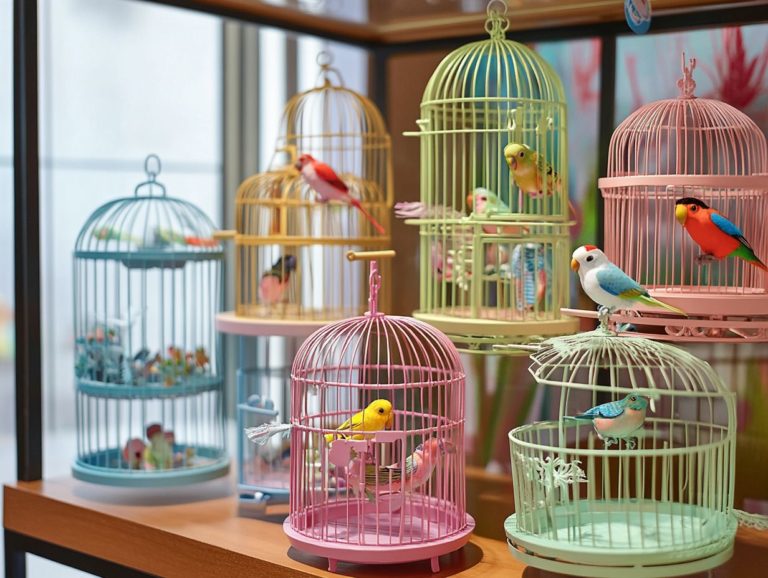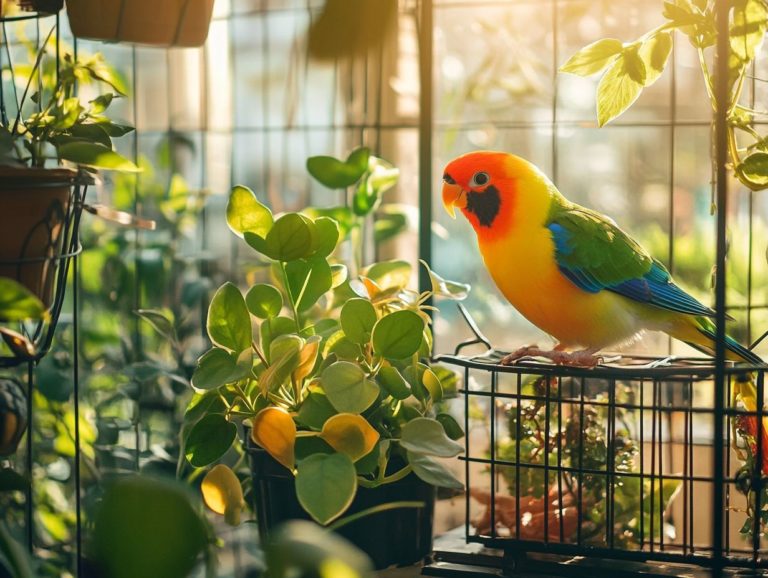Bird Cages: Indoor vs. Outdoor Considerations
Choosing the right bird cage can greatly affect your feathered friend’s happiness and well-being.
With a variety of options at your fingertips, from cozy indoor setups to expansive outdoor enclosures, it s crucial to carefully consider the pros and cons of each.
This article delves into the benefits and risks associated with both indoor and outdoor bird cages, addressing key factors such as size and climate. You ll find guidance on selecting the perfect cage that caters to your bird s specific needs.
From maintenance tips to ensuring a secure environment, this article is here to support you. Are you ready to create the ideal habitat for your avian companion? Let s dive in!
Contents
- Key Takeaways:
- Indoor Bird Cages
- Outdoor Bird Cages
- Key Factors for a Successful Aviary
- Choosing the Right Cage for Your Bird
- Ensuring a Safe and Comfortable Environment
- Frequently Asked Questions
- What are the benefits of using indoor bird cages?
- Are there any advantages to using outdoor bird cages?
- What factors should I consider when deciding between an indoor or outdoor bird cage?
- Can I use both indoor and outdoor bird cages for my bird?
- What are the potential risks of using outdoor bird cages?
- Discover how to pick the perfect bird cage for your feathered friend!
Key Takeaways:
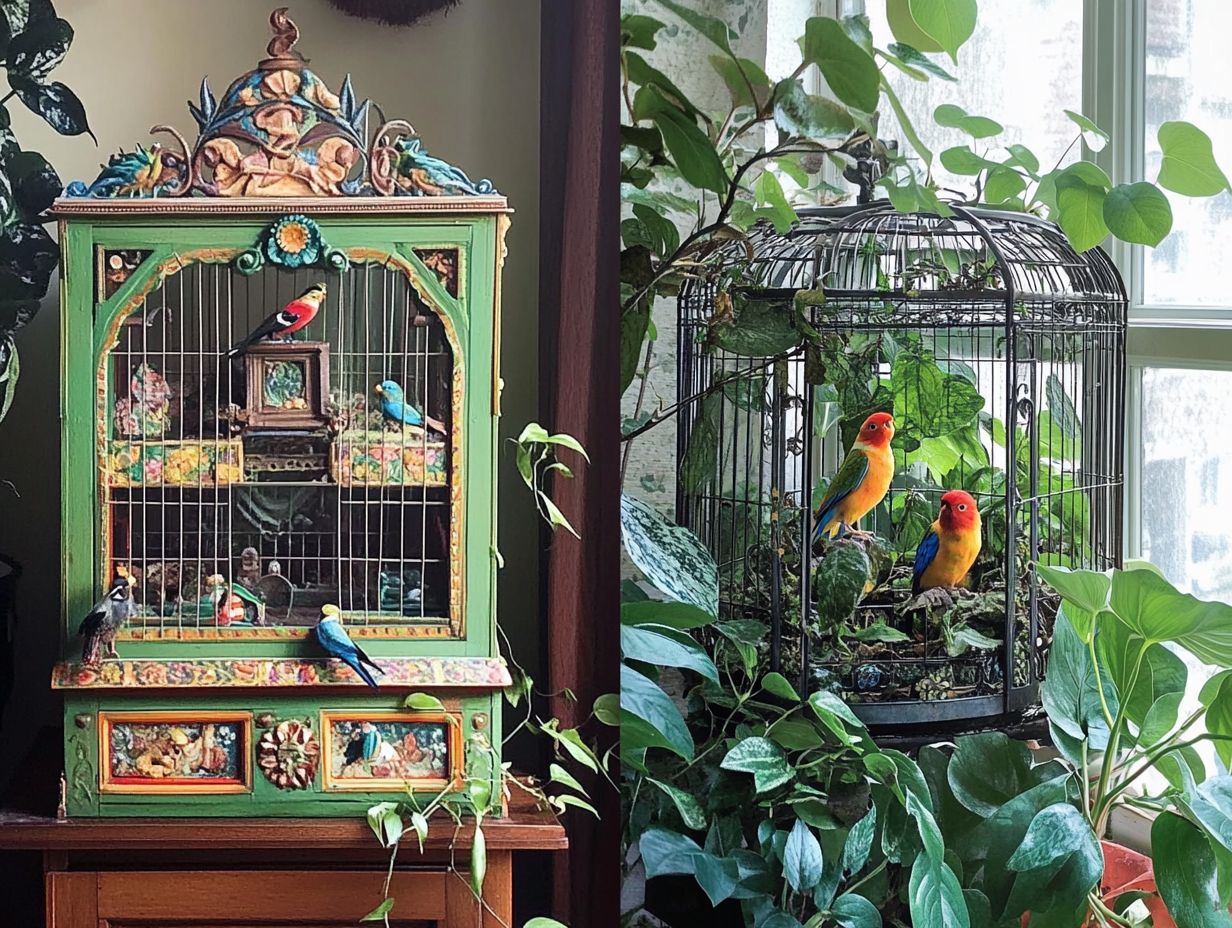
- Consider the advantages and disadvantages of indoor bird cages, such as convenience and potential hazards, when deciding on the best living space for your feathered friend.
- When considering an outdoor bird cage, weigh the benefits of fresh air and natural sunlight against the risks of predators and unpredictable weather.
- Size, material, climate, and location are all important factors to consider when choosing the right cage for your bird’s specific needs and well-being.
Indoor Bird Cages
Indoor bird cages are essential for bird housing, offering a controlled environment that nurtures the well-being of your pet parrots and other companion birds. Crafted with care, these cages come in a variety of sizes and materials, giving you the power to create a safe and enriching sanctuary for your feathered companions.
When selecting an indoor cage, it s vital to consider factors such as ease of cleaning, activities that make your bird’s life interesting, and the overall safety of your birds. This thoughtful approach ensures that you provide a comfortable haven for them.
The right indoor cage significantly impacts your bird’s behavior, health, and overall happiness.
Advantages and Disadvantages
Indoor bird cages offer advantages, such as enhancing bird safety, simplifying cleaning routines, and providing activities that make your bird’s life interesting. However, they also have some drawbacks, including limited space and potential stress for specific bird species.
These cages create a secure haven that shields your birds from household dangers like drafts, curious cats, and other pets, ensuring their well-being. Plus, the confined space makes cleaning a breeze, allowing you to maintain a hygienic environment with minimal hassle. That said, some birds, especially those used to roaming larger territories, may feel a bit cramped in these settings.
To address these challenges, consider rotating various enrichment activities or toys to keep things fresh and engaging for your feathered friends. Choosing the right cage size, combined with regular out-of-cage playtime, can enhance their comfort and help reduce stress levels, making their lives a little more joyful.
Outdoor Bird Cages
Outdoor bird cages, often referred to as large outdoor cages, present a remarkable opportunity for your pet birds to embrace the great outdoors. Your pet birds will thrive in this exciting outdoor experience!
These thoughtfully designed enclosures serve to shield birds from potential predators while granting them generous space for movement and camaraderie with fellow feathered friends. A well-constructed outdoor aviary can include essential features like shaded areas, feeding stations, and nesting sites, catering to the diverse needs of various bird species, especially those tropical beauties that flourish in sunny environments.
Benefits and Risks
The benefits of having an outdoor aviary are numerous. Your birds bask in natural sunlight and fresh air. They enjoy increased exercise and experience enrichment in their surroundings. However, you must acknowledge the risks, such as exposure to harsh weather and the threat of predatory birds.
To maximize the advantages while minimizing potential hazards, consider thoughtful design features that enhance safety. This might include installing protective roofing to shield the aviary from rain and sun. Using sturdy wire mesh can deter unwelcome predators. Placing shelters within the aviary provides your birds with a safe haven during bad weather.
By carefully weighing the pros and cons, you can create a thriving environment that prioritizes the well-being of your feathered friends. This allows them to revel in the joys of the outdoors without unnecessary risks.
Key Factors for a Successful Aviary
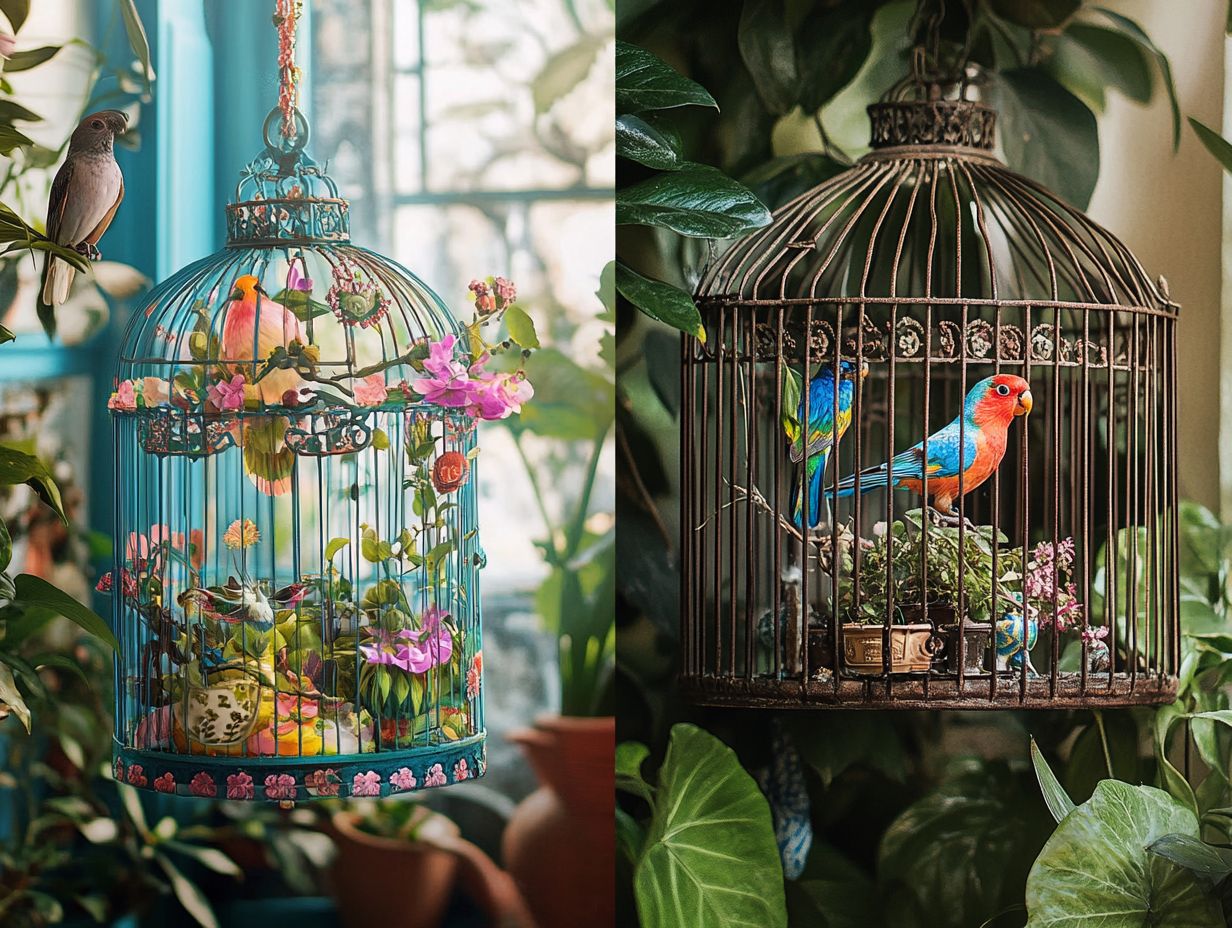
When establishing an aviary, consider several crucial factors to create the optimal habitat for your birds. Pay close attention to the design of the aviary and the placement strategies that minimize environmental risks.
Adhering to bird housing guidelines that prioritize safety and comfort is essential. Understanding the specific needs of the bird species you plan to house is key. Implementing effective pest control measures means keeping unwanted insects and animals away to ensure a secure environment.
The right size and structure of the aviary significantly influence the space requirements necessary for fostering healthy socialization and interaction among your feathered friends.
Size and Material
The size and material of an aviary are crucial in shaping its effectiveness as a bird enclosure. These factors directly impact space requirements, bird comfort, and the ease of maintenance.
Larger aviaries offer ample room for active species like parakeets and cockatiels. This allows them to stretch their wings and engage in natural behaviors essential for their overall well-being. The choice of materials be it metal, wood, or mesh also plays a significant role. It determines not just durability but also how safe the birds feel in their environment. While lightweight materials may simplify cleaning, they might lack the security needed for smaller bird species.
When selecting an aviary, you must consider how these elements intertwine to create a space that nurtures both hygiene and the happiness of your feathered friends.
Climate and Location
The climate and location of your outdoor aviary are key elements that shape its functionality and the safety of its avian residents. Proper weather protection is vital to shield the birds from extreme conditions while still allowing them access to sunlight and an enriching environment.
Understanding how various climates impact aviary design is essential for promoting the well-being of your feathered friends. In regions with severe winters, using insulating materials and heat sources can help create a cozy habitat. Conversely, in hotter climates, ensuring adequate ventilation and shade is crucial to prevent overheating.
When positioning the aviary, consider sunlight exposure carefully. Provide natural light without subjecting the birds to prolonged direct sunlight, which could lead to stress and health issues. Strategically placing foliage offers natural shelter, allowing the birds to seek refuge from bad weather, enhancing their comfort and safety.
Choosing the Right Cage for Your Bird
Selecting the perfect cage for your bird is a crucial choice that affects its comfort, well-being, and overall behavior. Whether you decide on an indoor cage or an outdoor enclosure, aligning the cage type with the specific needs of your bird species is vital.
Considerations such as size, material, and design significantly impact your pet parrot or other companion bird’s ability to thrive in its environment. Familiarizing yourself with bird housing guidelines is essential for crafting an enriching and secure habitat tailored to your bird’s unique characteristics.
Start planning your outdoor aviary today and give your birds the gift of freedom!
Matching Cage to Bird Species
Matching the cage to the specific bird species is vital for ensuring their comfort and well-being. Each species has unique space and socialization needs that must be met through suitable indoor cages or outdoor enclosures.
Larger parrots often call for spacious bird enclosures equipped with ample perches and climbing opportunities. Smaller finches, on the other hand, flourish in more compact environments that still allow them to flit about and socialize.
Considerations such as bar spacing, enrichment features, and the overall design of the cage can significantly impact a bird’s mental stimulation and physical health. By understanding these unique characteristics, you can make informed decisions between popular cage types, such as flight cages, breeding cages, or even customized setups. This ensures your feathered friends enjoy a comfortable and happy habitat.
Maintenance and Cleaning
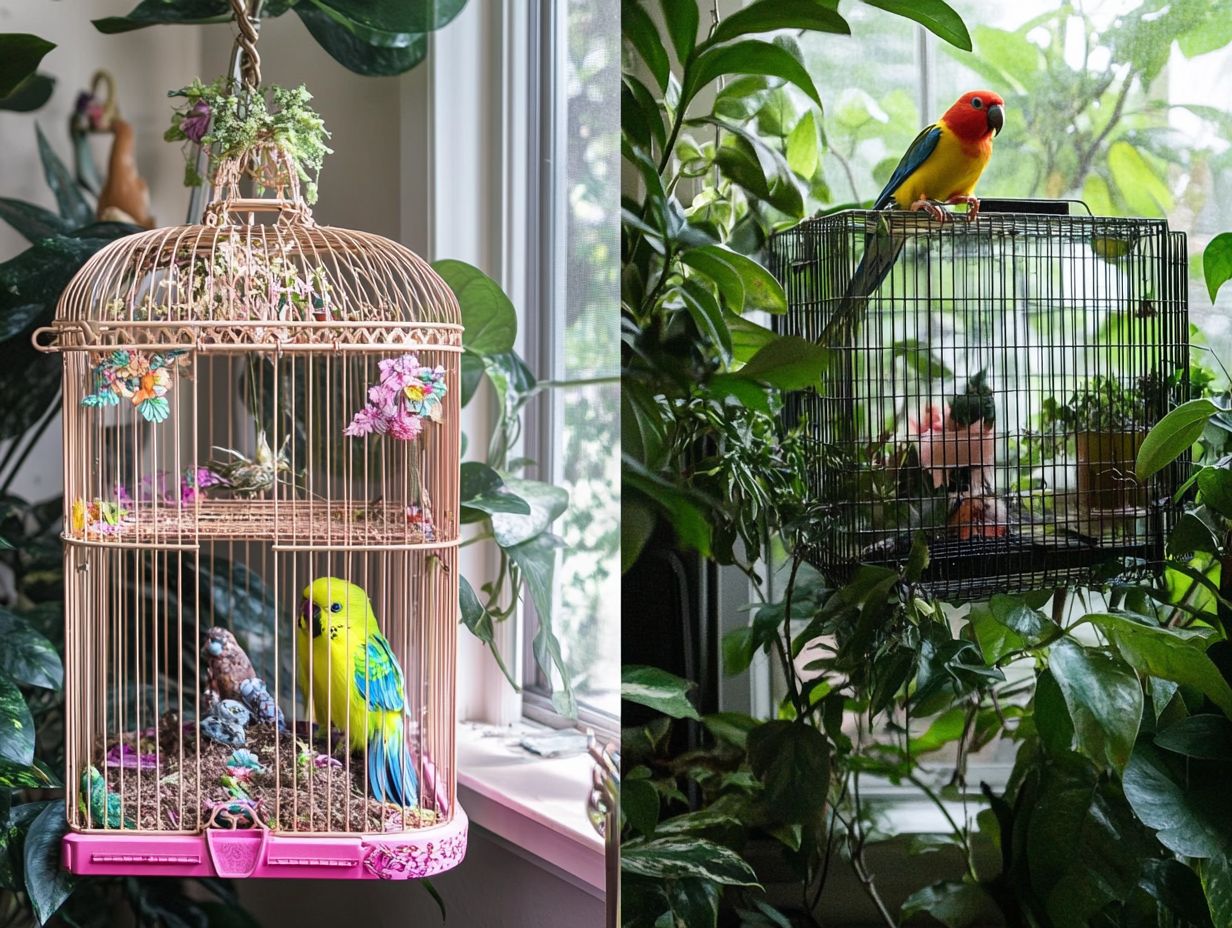
Maintenance and cleaning are essential for creating a healthy living environment for your birds. Establishing regular cleaning routines for both indoor cages and outdoor enclosures helps prevent the buildup of waste and pathogens.
To achieve optimal hygiene, it s crucial to set up a consistent cleaning schedule. Aim to clean indoor habitats at least once a week. Outdoor enclosures may require more frequent attention due to exposure to the elements. Effective cleaning methods include removing droppings and uneaten food daily, followed by a thorough wash of surfaces with bird-safe disinfectants.
Regularly inspecting perches, toys, and feeding stations for signs of wear or buildup is key to maintaining a safe and enjoyable environment. Engaging in these practices helps enhance the well-being of your birds and deepens the bond between you and your feathered companions.
Ensuring a Safe and Comfortable Environment
Creating a safe and comfortable sanctuary for your birds requires careful consideration of several key elements. You ll want to think about the optimal placement of their cage, choose accessories that enhance their quality of life, and provide environmental enrichment that caters to their natural behaviors.
Ensuring their bird safety involves taking proactive steps to shield them from potential hazards, such as predatory birds and adverse environmental conditions. By curating their environment thoughtfully, you promote their welfare and foster healthy social interactions and enrichment practices, contributing significantly to their overall happiness.
Proper Placement and Accessories
The proper placement considerations of your bird enclosure are vital for ensuring the safety and comfort of your birds. The right accessories can significantly enhance their environment, offering enriching and stimulating opportunities.
Select a location that shields your feathered friends from harsh weather, whether it be the blazing sun or strong winds. This is essential for creating a safe haven where they can flourish.
Incorporating features such as perches at varying heights, safe toys, and natural plant life can greatly enhance their well-being and encourage bird behavior that keeps them engaged and happy.
Ensuring that the bird enclosure is securely constructed and regularly maintained prevents escapes and protects against potential predators lurking nearby.
A thoughtful layout and design can spark curiosity and exploration, allowing your birds to thrive in an engaging habitat that prioritizes their mental and physical health. Consider incorporating aviary design elements that cater to the specific needs of tropical birds.
Frequently Asked Questions
What are the benefits of using indoor bird cages?
Indoor bird cages provide a safe and controlled environment for your bird, protecting them from outdoor predators and harsh weather conditions. They also allow for easier monitoring of your bird’s health and behavior.
Explore more about bird care and consider adopting a bird to experience the joy of having a feathered companion!
Are there any advantages to using outdoor bird cages?
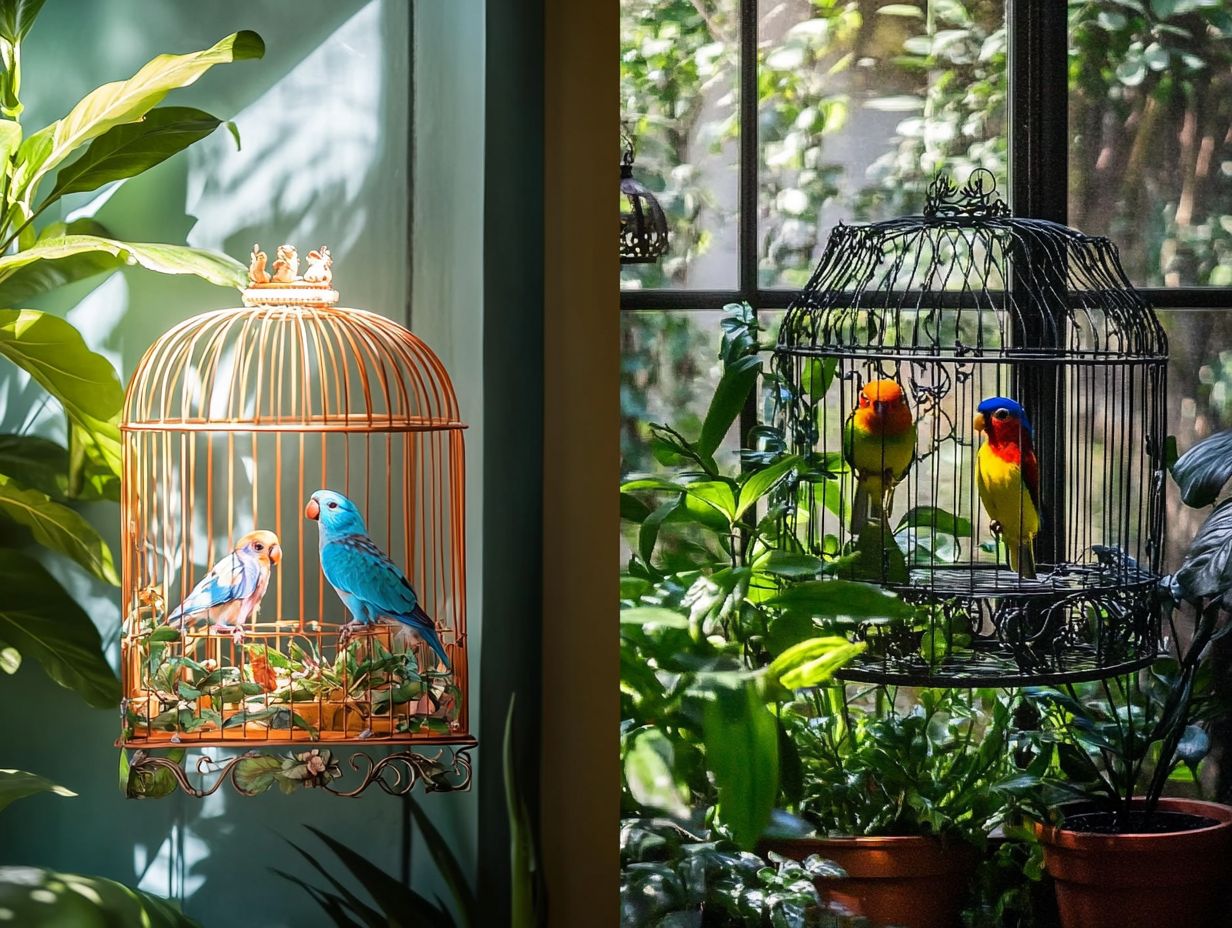
Outdoor bird cages can provide a more natural environment for your birds. They allow for fresh air and sunlight, especially in sunny shaded areas.
Additionally, they offer more space for your birds to fly and exercise.
What factors should I consider when deciding between an indoor or outdoor bird cage?
Consider your bird’s species, size, and behavior. Also, think about your climate and available space.
Some birds thrive better indoors, while others do well in an outdoor aviary (a large enclosure for birds).
Can I use both indoor and outdoor bird cages for my bird?
Yes, you can use both types of bird housing for your pet. Ensure that the cages are secure to provide a safe transition between the two environments.
What are the potential risks of using outdoor bird cages?
Outdoor enclosures may expose your bird to outdoor predators and harsh weather conditions. They can also pose potential toxins or hazards.
Regularly check and maintain the cage to keep your bird safe and happy!
Discover how to pick the perfect bird cage for your feathered friend!
The right bird cage should be spacious enough for your bird to move around and stretch its wings. It should also have secure latches and doors.
Choose materials that are safe and durable. Consult with a veterinarian or a bird specialist for specific recommendations based on your bird’s needs.

